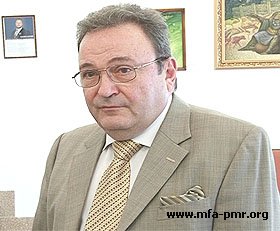A regular round of negotiations on the settlement of the Pridnestrovian conflict in the 5+2 format concluded in Vienna. Ambassador-at-Large of the Russian Foreign Ministry Sergey Gubarev representing Moscow told chief editor of «Kommersant.md» Vladimir Solovyev what the sides could achieve and why question about final settlement of a lasting conflict on the Dniester shouldn't be raised at this moment.
- Please, tell about results of Vienna round of negotiations in the 5+2 format. There is again nothing to boast of?
- The work of the Permanent Conference has entered the stage when it represents a routine process uninteresting for a casual observer without striking breakthroughs. At the same time, exactly such work is the crux of negotiations. Today the task is to solve issues emerging in everyday life of people living on two sides of the Dniester.
-What are these issues?
- Situation in railway and automobile communication. Situation in the sphere of education. This is what constitutes everyday life of people. We listened to views and positions of one and another side. Participants of the Conference issued recommendations to Kishinev and Tiraspol and following them can significantly facilitate solution of vital issues.
- Can You voice these recommendations?
- They relate to a more substantial analysis of the situation connected with nostrification (mutual acceptance – “Commersant.md”) of documents on education and issues regarding startup of new railway routes. This is what Vladimir Filat and Yevgeny Shevchuk told about earlier on and what is defined in their Joint Communiqué.
- Please, specify what routs are meant?
- Launching of Kishinev–Tiraspol–Rostov-on-Don and Kishinev–Tiraspol–St. Petersburg trains. Moreover, problems hindering implementation of the project on automobile communication via Gura-Bykului–Bychok bridge were thoroughly discussed. It is not an easy question for many reasons. First, the bridge needs to be repaired. And not only the bridge but some sections of highway as well.
- The Europeans were allegedly willing to finance repairs. What's the problem?
- The point is that the bridge is situated in the Security Zone of the Pridnestrovian conflict. There is a separate agreement on non-use of such bridges for military purposes but this bridge didn't fall under this agreement because when it was being developed the bridge was unusable. All these points should be settled. First of all, with involvement of opinions and expert evaluations of the Joint Control Commission.
- So, one cannot boast of concrete agreements?
- A positive thing is that reports and speeches of representatives of the two sides were constructive. To a greater extent they were aimed not at mutual accusations but rather at attempts to find the ways to solve problems. Issue which caused misunderstanding of considerable number of those involved in the negotiations was also discussed. Here I mean statements made by the Moldovan side regarding finalization of the work on the document “On Principles and Procedures of Carrying out Negotiations” which was agreed upon this April. In several statements one could discern unilateral interpretation of the principle of equality of the sides included in the document as the outcome of uneasy compromise. As a result, the Moldovan side gave clarification from which it follows that journalists had distorted the true meaning of its statements and it's only their fault.
- So, was the principle of equality of Kishinev and Tiraspol in the negotiation process approved or not?
- Yes, it was. Following the meeting, a protocol was signed which gave legal force to the document agreed upon in April. Irish Chairmanship will publish the document and it will be publicly available.
- Then, the sides are equal now, aren't they?
- Yes, we can consider that Kishinev and Tiraspol are equal.
- And what about political settlement of the conflict? When do you plan to start it?
- Both Kishinev and Tiraspol have answers to the question what the model of political settlement looks like. And each side has its own answer. If we want to hear them again then the question about political model of conflict settlement can be put. But the question is whether this is exactly our goal? Should we escalate the situation when fragile confidence between the two banks has only begun to shape? Moldova hasn't abolished the law of 2005 about special status of Pridnestrovie which Tiraspol doesn't agree with. And nobody in Pridnestrovie has canceled outcome of Referendum of 2006 (more than 90% of Pridnestrovian people voted in favour of independence from Moldova – Kommersant.md) which Kishinev doesn't agree with. If today we raise this question with all straightforwardness, then political representatives will answer it with the same straightforwardness. And what shall we do next? It seems to me it's too early to put to such test that fragile climate of mutual understanding which has currently established.
Source of the material http://www.kommersant.md/node/9127








